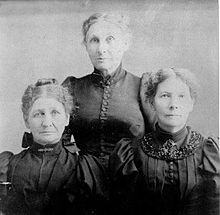This past week, while I’ve been caring for my daughter with a broken leg, I’ve thought about the injuries the pioneers to Oregon suffered on their journey. Accidents and disease were much greater risks to the emigrants than Indians, despite what we see in Western movies.
One of every seventeen emigrants died along the trail. Almost every account of travel on the Oregon Trail contains one or more descriptions of broken bones, gunshot wounds, drownings, or other calamities.
Catherine Sager Pringle, mentioned in an earlier post, broke her leg while traveling the plains in 1844, when she was nine years old. She survived, but had a permanent limp as a result.
This is how Catherine described her injury:
August 1st we nooned in a beautiful grove on the north side of the Platte. We had by this time got used to climbing in and out of the wagon when in motion. When performing this feat that afternoon my dress caught on an axle helve and I was thrown under the wagon wheel, which passed over and badly crushed my limb before father could stop the team. He picked me up and saw the extent of the injury when the injured limb hung dangling in the air.
In a broken voice he exclaimed: “My dear child, your leg is broken all to pieces!” The news soon spread along the train and a halt was called. A surgeon was found and the limb set; then we pushed on the same night to Laramie, where we arrived soon after dark. This accident confined me to the wagon the remainder of the long journey.
My daughter had a titanium rod inserted in her leg to position it correctly and provide support as she recovers. She received antibiotics to reduce the chance of infection and pain killers to keep her comfortable.
Think of Catherine recovering from a broken leg after her accident, lying in a wagon that jostled and swayed over every rock and hole in the ground for hours at a time, and for the long weeks it took to get from Fort Laramie to Oregon. Because she was a child, Catherine probably didn’t even get alcohol to dull the pain.
When I am tempted to romanticize the pioneer life or to bemoan the frenzy of our modern world, it helps to remember that some things – and medical care is one of them – are substantially better than they were 150 years ago.

A crushed leg was not the last disaster in Catherine’s life. Both her parents died of illness before the wagon train reached Oregon. Other families in the wagon company cared for Catherine and her siblings, until the orphans were left with Marcus and Narcissa Whitman at the Whitman Mission.
Three years later, in 1847, the Whitmans were killed by Indians. The surviving Sager children were farmed out to live with other families. Later, one of Catherine’s sisters was killed at age 26 by an outlaw.
Despite these tragedies, Catherine survived. She married a Methodist minister, Clark Pringle, and had eight children. She lived to be 75, and died in 1910.
Catherine wrote a detailed account of her life as an emigrant and at the Whitman Mission. Her saga was not published until after her death, but it is now deemed one of the most authentic records both of life along the Oregon Trail and of the Whitman Massacre.




Hope our patient is mending well and her nurse is being blessed also.
Reading about the struggles of those who traveled the Oregon Trail is so interesting, Theresa. Thank you for sharing these stories. I hope your daughter is continuing to heal.
Your stories, Theresa, take me beyond my imagination and give me a vivid picture of the hardships they incurred while traveling the Oregon Trail.
I wish your daughter a full recovery and a smooth ride.
I love these stories about the Oregon Trail and look forward to your blogs. Keep them coming.
Thanks for all the comments and good wishes. My daughter is doing reasonably well — some pain still, but less than jostling in a wagon!
Theresa
Wonderful post- on the history side. Sorry to hear of the present daughter events. I think the movies made the wild west look glamourous. Just day to day living of dressing, cooking over open fires, washing clothes in a stream…I so admire those women in history.
Thanks,
Linda Joyce
Thanks, Theresa. I’ve thought about your essay all week from time to time and it’s helped me avoid too much whining about my poor aching and creaking knee. At least I have one! And it’s not crushed.
You are often in my mind, my dear. Take good care of you and your daughter. J.
Janet, thank you. And I hope your knee improves.
Theresa
Wow that was unusual. I just wrote an extremely long comment but
after I clicked submit my comment didn’t appear. Grrrr… well I’m not writing all that over again.
Regardless, just wanted to say excellent blog!
Sorry you had trouble commenting — I appreciate your reading the blog.
Theresa
[…] Accidents on the Oregon Trail: Catherine Sager Pringle […]
On into the west that happened to a character. The character’s name was Rachel Wheeler. A wagon ran over her leg which caused infection and had too be amputated. She died during the botched operation